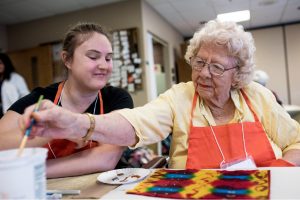 Nick Viti (OMA Facilitator Class of 2015) has launched a highly successful OMA program at The Cedars in Portland, Maine. The facility has already begun their third OMA session. They partner with the University of Southern Maine and the University of New England, where students receive college credit to participate in the OMA program.
Nick Viti (OMA Facilitator Class of 2015) has launched a highly successful OMA program at The Cedars in Portland, Maine. The facility has already begun their third OMA session. They partner with the University of Southern Maine and the University of New England, where students receive college credit to participate in the OMA program.
The site had their first art show in June as a part of Portland’s First Friday Art Walk, a monthly community event. They also plan to exhibit at partnering universities. OMA Artists have an exhibit at USM in Lewiston, ME right now! Check out their video featuring an OMA session and the art show.
“One of our elders said to her partner, ‘I’m not an artist,’ at the start of every session until the very last project when she finally said, ‘I am an artist!”
Nick took the time to answer a few questions about what his experience has been like.
What have you learned as an OMA Facilitator? What advice would you give?
“I was anxious when we were putting OMA together at The Cedars. I learned that you may never really feel ready to start your first session, but you have to just jump into the experience and trust in the process. My co-facilitator, Pamela Moulton, who is a mixed medium artist, was extremely helpful in securing right supplies from the start, as well as overseeing the selection of colors we present to our artists.
Also, it’s important to pay attention to placement of residents in the room. Some residents may be overwhelmed by a lot of people around them so they may do better with the room at their back, while others may feel uncomfortable without being able to see the whole room. They may need to see what others are doing to understand the experience.
Find good partners for your volunteers! College programs in the area have been a tremendous resource for us and we have collaborated with them to create a 3-credit undergraduate course about geriatrics and long term care. The students get a lecture from one of our departments for an hour before starting the OMA project of the day to teach them about all the different disciplines that support our residents and how they work together in order to provide quality person-centered care. There has been a very positive response to this opportunity that is very unique compared to other experiences offered at the undergraduate level. In addition, I try to get to know the students through the two day dementia/OMA trainings to make good pairings with residents, especially those who may need to be especially patient or be process vs. product focused in order to enable the best chance for the residents’ success.
“Don’t neglect your artwork. Color is emotion, you got to let it out.” – OMA Artist
Have there been any challenges that you’ve overcome while facilitating OMA?
“Finding the right residents who are going to be open to joining OMA and willing to participate consistently can be a challenge. Sometimes you just don’t know. I usually select the toughest potential artists first and try to involve them in the OMA process for a couple weeks. After the first class there are some substitutions that take place because some residents don’t like trying something new around other people, or the time of day isn’t good for them, etc. I always have a list of alternates that I think are a surer bet so I don’t subject the students to constantly changing partners and the final pair can begin the process of bonding over the course of remaining weeks.
Also, transportation of elder artists to OMA continues to be a challenge for us. We have made improvements in the timeliness of getting artists from the second floor to our first floor art space, including advanced notice of who the OMA artists are to neighborhood staff, prioritizing which artists benefit from coming first, recruiting additional staff to assist with transportation, and checking in with elders in the morning prior to OMA sessions. However, you never know what situations you are going to find when you are ready to bring the artists down so substitutions happen often. Fortunately, OMA is popular with past participants and our students have been very flexible so we always have a full house!”
For more information on the innovative programs at The Cedars, contact Nick Viti, OTR/L, Life Enrichment Director at 207-221-7000.
